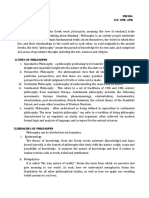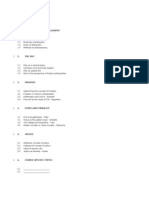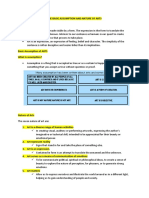0% found this document useful (0 votes)
23 views2 pagesPhilosophy for Thoughtful Minds
Philosophy analyzes the foundations of other disciplines and seeks to develop a comprehensive understanding of the world. It has several main branches:
Metaphysics explores the fundamental nature of reality, existence, and the cosmos. Epistemology studies the nature, limits, and validity of human knowledge. Ethics examines concepts of right and wrong behavior and moral principles. Aesthetics is the philosophical study of beauty, art, and taste. Logic analyzes reasoning and arguments. The branches help philosophers investigate life as a whole and critically evaluate our deepest beliefs.
Uploaded by
Princess Ela Mae CatibogCopyright
© © All Rights Reserved
We take content rights seriously. If you suspect this is your content, claim it here.
Available Formats
Download as PDF, TXT or read online on Scribd
0% found this document useful (0 votes)
23 views2 pagesPhilosophy for Thoughtful Minds
Philosophy analyzes the foundations of other disciplines and seeks to develop a comprehensive understanding of the world. It has several main branches:
Metaphysics explores the fundamental nature of reality, existence, and the cosmos. Epistemology studies the nature, limits, and validity of human knowledge. Ethics examines concepts of right and wrong behavior and moral principles. Aesthetics is the philosophical study of beauty, art, and taste. Logic analyzes reasoning and arguments. The branches help philosophers investigate life as a whole and critically evaluate our deepest beliefs.
Uploaded by
Princess Ela Mae CatibogCopyright
© © All Rights Reserved
We take content rights seriously. If you suspect this is your content, claim it here.
Available Formats
Download as PDF, TXT or read online on Scribd
/ 2


































































